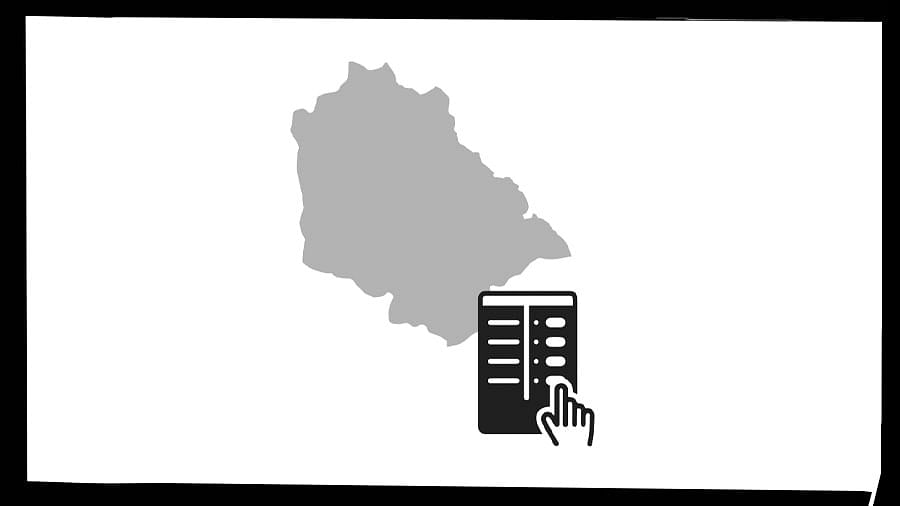
Credit: DH illustration
William Shakespeare’s play King Henry IV has a famous line: “Uneasy lies the head that wears a crown.” But the tragic politics of Jammu & Kashmir (first as a princely state, then a Union state, and now as a diminished Union Territory) further validates that the metaphorical crown on the ‘Crown of India’ i.e., J&K, has always been uneasy. The wounded history ensures that the key players in its narrative were no binary villains or heroes, as the topical winds defined their perceptions.
The much-forgotten Maharaja Hari Singh was no autocrat, as some among the ‘Valley’ politicians made him out to be; if anything, his initial reluctance to join the Indian dominion was considering his Muslim-majority populace. That a fellow Kashmiri in Delhi, Jawahar Lal Nehru, was on the opposite side of political ambitions, ensured that the much-misunderstood Maharaja was literally ousted, diminished, and died a broken man. Similarly, the tallest Kashmiri politician in the initial years, Sheikh Abdullah, faces similar divergence of perceptions. Recent right-wing domination in ‘Delhi’ has vilified Sheikh Abdullah and his legatees in the National Conference as corrupt dynasts, even going as far as questioning their patriotism. While unquestionably Sheikh Abdullah remained flighty and manipulative throughout his career with his political positions and alliances, he was no hero or ally of Pakistan. Sheikh Abdullah’s trenchant commentary on Pakistan, “I had thought all along that the world had got rid of Hitlers and Goebbels, but from what has happened and what is happening in my poor country, I am convinced that they have only transmigrated their souls into Pakistan...”, suggests otherwise. However, ‘palace intrigue’ and wanton ambition amongst the Kashmiri political class ensured unhealthy invocation of reckless religiosity and even referencing of Pakistan into the admixture to conjure complexities. No national or regional party can claim to be holier-than-thou in the murky politics of J&K, as each has made tactical alliances with each other when convenient and then indulged in slander (including calling some ‘anti-India’) when the purpose was served.
Nonetheless, the fact that elections were routinely held and funds for the socio-economic development deployed to heed to common people’s woes served to discredit Pakistan’s claim of diminishing Kashmiri voice. With all its purported electoral malpractices and unholy alliances, the continuation of democratic imperatives ensured the high ground for India at all global forums. Politicians across the political divide did what they do best, i.e., polarise and legitimise bad actors. Kashmir was often on a boil, with the situation peaking with the wave of pan-Islamism sweeping the world. Not only did the pernicious outcomes of such toxic religiosity backfire across the world, but even the ‘terror nurseries’ like Pakistan ended up with a backflow of terrorism. Soon enough, global terror started ebbing or at least metastasising into a sectarian dimension (Iran and its proxies) or remaining area-specific (e.g., Hamas in the Gaza Strip). The fact that the traditional benefactors of terrorism like Pakistan faced an existential crisis further took the heat from terrorism. Obviously, such external factors that disrupted the supply chain of terrorism were downplayed as ‘Delhi’ started patting its own back for restricting terrorism in Kashmir, attributing changes solely to its own actions, e.g., abrogation of Article 370, etc.
Sadly, things are never as simple as ‘return to normalcy’, as prematurely claimed by opportunistic politicians to galvanise the mood in the ‘rest of India’. Terror attacks regularly punctured brief lulls, and the Indian Army stood up to all challenges, at the cost of many who paid the ‘ultimate price’. Reality was further reiterated when, while the abrogation of Article 370 was posited as a transformational and winning ‘masterstroke’, the ruling party shied away from putting their candidates in all three Kashmir-based Lok Sabha seats (one seat was even won by a secessionist leader). Even portents from Ladakh suggested that all was not okay. The repeatedly promised elections to the UT Assembly were put on the backburner, and it took a rap from the Supreme Court to finally announce elections
in September.
Therefore, irrespective of who wins, the fact that elections will be held is a much-needed sign of inclusivity for the locals, as opposed to the barrage of innuendoes (which fuels dangerous alienation) that had become the norm since the dissolution of the state Assembly on November 21, 2018. The convenient bogey of painting all major regional parties as ‘anti-India’ too must stop, as it belies the fact that all national parties (including the current ruling dispensation) had made alliances with each one of them, and the demonstrated ‘hyper-nationalism’ emerged after they had finished using them, tactically.
While the ‘Valley-versus-Plains’ divide is still obvious, perhaps the polarisation between the two in terms of religious denominations (and their conflation with political parties) has run its course. While the ruling national party won both the Jammu seats, i.e., Udhampur and Jammu, the scoreline trend was telling. For the winners in 2024, the voting percentage dropped from 61.4% and 58.02% in 2019 to 51.2% and 53.4% at Udhampur and Jammu, respectively (it increased for the opposition national party from 30.1% and 37.4% to 40.1% and 42.9%, respectively). Perhaps the people are tiring of the polarising ‘Valley-versus-Plains’ narrative. This evolutionary change should put more emphasis on positive issues such as societal healing, inclusion, genuine development (beyond promises like ‘Smart Cities’), etc., that help both the Jammu plains and the restive Kashmir valley, as well as indeed India as a whole.
The fact is that all political parties have much to account for their respective misdeeds, and no one, without any exception, has been above board. But the self-correcting imperatives of democracy augur well for the long run, and the J&K situation has survived not because of politicians but despite them. They are a simple necessity that can auto-correct, and the lay of the land is poised for that opportunity, despite the divisive rhetoric that is inevitable in the run-up to elections, finally.
(The writer is former Lt Governor of Andaman & Nicobar Islands and Puducherry.)